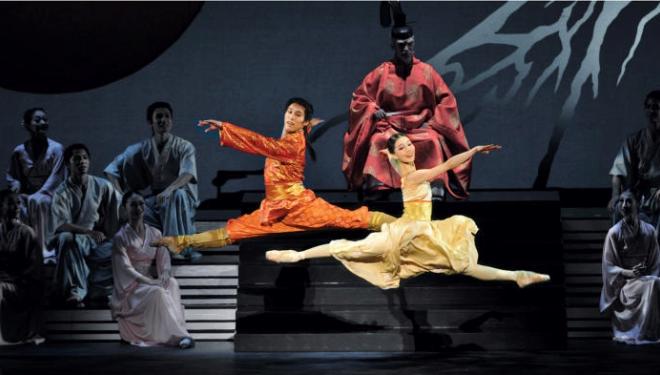
Remember Darcey Bussell's mesmerising performance in Kenneth MacMillan's The Prince of the Pagodas? You know, the one which launched her career. Well, David Bintley has choreographed an Oriental version to Benjamin Britten’s only full-length ballet score, which is coming to London for the first time. It will form one of the closing highlights of the Britten centenary.
For years Bintley, director of both the Birmingham Royal Ballet and the National Ballet of Japan, longed to take up the challenge of choreographing his own version. He finally had his chance in 2011 at the invitation of the National Ballet of Japan. He adapted a Japanese fairy tale to tell, through dance, the story of an Eastern princess who goes in search of her lost brother in order to restore harmony to her father’s Empire of the Chrysanthemum Throne. He emphasised the Oriental elements of the score, making the most of Britten’s transcription of Balinese gamelan music to depict the magical Kingdom of the Pagodas, and won over audiences and critics alike in Tokyo.
The original version got a stickier reception, however. Commissioned by the Royal Ballet back in 1957, the collaboration between Britten and the young choreographer John Cranko was an uneasy one. Cranko conflated several fairy tales – The Sleeping Beauty, Beauty and the Beast, Cinderella, The Frog Prince – with Shakespeare’s King Lear. The ballet was not a success and Britten’s score lay dormant (apart from extracts) until 1989, when MacMillan resurrected it for his three-act version for the Royal Ballet.
Bintley's version benefits from spectacular designs by Rae Smith, whose drawings provide the epic backdrop to the National Theatre’s award-winning War Horse. How has Bintley resolved the problems of the initial scenario which determined Britten’s descriptive score? He chooses a heroine who has many obstacles to overcome on her long rescue journey before the Empire can rejoice. Instead of a romantic love story involving a salamander prince, Bintley offers the power of family love: the love of a sister for a brother, a father for a son. In his choreography he has adapted the gestural language of traditional Japanese theatre as well as the style of 19th century woodblock prints and paintings. His is the third choreography that The Prince of the Pagodas has received. Will this Oriental version turn out to be the definitive one?
| What | The Prince of the Pagodas at the London Coliseum |
| Where | London Coliseum, St Martin's Lane, , London , WC2N 4ES | MAP |
| When |
26 Mar 14 – 29 Mar 14, 7.30pm except 2pm Thurs & 2.30pm Sat |
| Price | |
| Website | To book via the London Coliseum |
